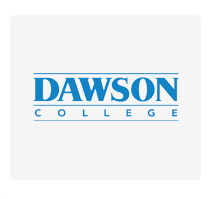Projet F01. Comment les assistants virtuels et les applications pour téléphones intelligents basées sur l’IA peuvent-ils aider les étudiants de niveau postsecondaire en situation de handicap à réussir leurs études ?
ÉQUIPE DE RECHERCHE

Dawson College

Université McGill

Université Concordia
Responsable du projet
Résumé
Le but était d’explorer les caractéristiques et les fonctions des assistants virtuels basés sur l’IA et des applications des téléphones intelligents qui peuvent aider les étudiants de niveau postsecondaire en situation de handicap à réussir leurs travaux scolaires. Pour atteindre cet objectif, nous avons effectué une vaste recherche documentaire et rassemblerons des intervenants de divers secteurs en créant un conseil consultatif de 15 membres. Sur la base de ces informations, nous avons créé un questionnaire accessible sur l’utilisation d’assistants virtuels basés sur l’IA et sur les applications des téléphones intelligents, afin d’obtenir le point de vue inestimable des étudiants.
Publications, présentations, ressources
- Adaptech Research Network. (2020, May). Canadian and international experts weigh in: An annotated list of AI-related resources for college and university students with and without disabilities. Montreal (DOCX)
- Vo, C. (2021, January 28). Use of virtual assistants for schoolwork. Adaptech Research Network. (DOCX)
- Martiniello, N., Asuncion, J., Fichten, C., Jorgensen, M., Havel, A., Harvison, M., Legault, A., Lussier, A., & Vo, C. (2020). Artificial intelligence for students in postsecondary education: A world of opportunity. AI Matters, 6(3), 17-29 (PDF)
- Fichten, C., & Vo, C. Coding Manual: What 237 Post-Secondary Students Said About Their Technologies for Schoolwork in 2019-2020. Adaptech Research Network. (XLSX)
- Fichten, C., Jorgensen, M., & Legault, A., in collaboration with Vo, C., Pickup, D., Martiniello, N., & Concordia’s CSLP Systematic Review Team. (2021, April 7). The intel on AI: Adaptech looks at post-secondary students with disabilities and artificial intelligence [Invited speakers]. CRISPESH Midi-Conférence, Montreal, QC, Canada (PPT EN, PPT FR)
- Concordia’s CSLP Systematic Review Team. (2021). Systematic Review: How can virtual assistants and AI-based smartphone apps help post-secondary students with disabilities succeed in their studies (DOCX)
- Fichten, C., Jorgensen, M., Arcuri, R., Vo, C., Budd, J., Legault, A., & Havel, A. (2021, June 3). Are AI-based virtual assistants such as Siri, Alexa, and Google Assistant ready for college? [Virtual poster presentation]. 10th Annual SALTISE Conference, Montreal, QC, Canada. (PPT)
- Fichten, C., & Jorgensen, M., in collaboration with Martiniello, N., & Vo, C. (2021, March 6-14). Are AI based apps smart enough for college students? [Conference presentation]. 36th Annual CSUN Assistive Technology Conference, Northridge, CA, United States. (PPT)
- Fichten, C., Jorgensen, M., Pickup, D., Schmid, R., & Libman, E. (2021, December 15). AI project objectives, goals, and accomplishments: How Can Virtual Assistants and AI-Based Smartphone Apps Help Post-Secondary Students with Disabilities Succeed in their Studies? [Invited speakers] Last meeting of the PIA community of practice “Training Projects,” Montreal, QC, Canada. (PPT)
- Fichten, C., Pickup, D., Asuncion, J., Jorgensen, M., Vo, C., Legault, A., & Libman, E. (2021). Current state of the research on artificial intelligence based apps for post-secondary student with disabilities. Exceptionality Education International, 31(1), 62-76. (PDF)
